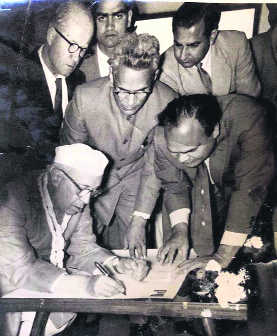Ahead of auction, Jeanneret’s letter courts a controversy
Ramkrishan Upadhyay
Tribune News Service
Chandigarh, October 11
Tarun Mathur, an architect and son of renowned late architect BP Mathur, has raised questions over the genuineness of the language used by Pierre Jeanneret in a letter being put up for auction in Spain.
A rare letter claimed to be written by Jeanneret, a colleague of Le Corbusier and a Swiss architect, will go under the hammer on October 30.
It is claimed that Jeanneret wrote this letter from Chandigarh on July 18, 1964, in his capacity as the Chief Architect of the city to Anthony Krafit (a journalist) of Switzerland for rectifying a mistake in an article of Santosh Ghosh, which was published in French.
Jeanneret contested Ghosh’s claim that Gandhi Bhawan, a building at Panjab University in Chandigarh, was designed by BP Mathur. He said it was him and not Mathur who had designed the building. The letter was sent to Calcutta to Ghosh and a copy to the newspaper office in Switzerland.
Mathur said, “The language in the letter is certainly not Jeanneret’s. If one is to read his other letters, many of which are in the archives, his style and expression were a lot more lucid and convincing. The letter, with its raw expression, has been most probably drafted by someone else. Besides, Jeanneret rarely spoke English. Whatever little conversation he had was mostly in French.”
Mathur said Gandhi Bhawan is a classic case of modern architecture and owes its design to a team of architects, Jeanneret, BP Mathur and Agya Ram, an engineer. The team contributed their strengths and abilities to create a landmark building.
Mathur said Jeanneret was an exceptionally gifted designer, a dreamer and a visionary. He visualised the forms and the concept, drew rough sketches and passed them to BP Mathur to make the drawings and give them the final shape. The challenge of the buildings was not just aesthetics but structural engineering principles also, a crucial skill provided by a talented engineer, Agya Ram. The challenge of Gandhi Bhawan was the lotus shape, a symbol of purity, a principle espoused by the father of the nation, Mahatma Gandhi.
Mathur said Jitender Kumar (82), son of architect Agya Ram, also raised questions over the letter. He said Jitender Kumar, an architect, used to teach at the Chandigarh College of Architecture at that time.
Jitender Kumar clarified that Jeanneret evolved rough sketch outlines, which were further developed, detailed and formalised by BP Mathur. BP Mathur in turn relied on Agya Ram for complex structural shapes and ensured that a unique design, along with structural integrity, was created.
Unlock Exclusive Insights with The Tribune Premium
Take your experience further with Premium access.
Thought-provoking Opinions, Expert Analysis, In-depth Insights and other Member Only Benefits
Already a Member? Sign In Now










